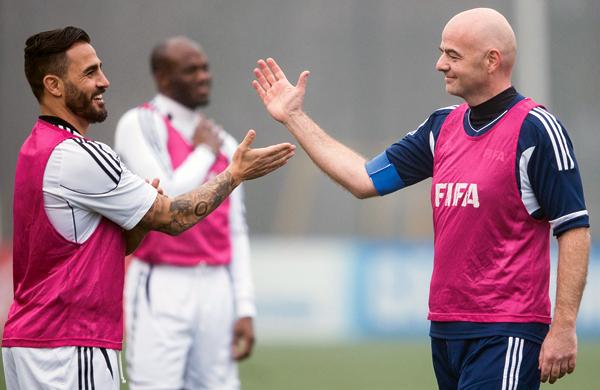You are here
FIFA resists video help for refs, then red card issue in EPL
By AP - Mar 01,2015 - Last updated at Mar 01,2015
HOLYWOOD, Northern Ireland — Faced with football’s “biggest decision ever”, FIFA said on Saturday it would not be rushed into approving — or even testing — video technology to improve the accuracy of referees’ decisions.
But an incident in the English Premier League then highlighted why the English Football Association (EFA) pushed FIFA to embrace technology beyond existing goal-line aids, at a meeting of the game’s rule-makers on Saturday.
In Manchester United’s game against Sunderland, it appeared the wrong player might have been sent off when a penalty was awarded. Sunderland defender John O’Shea pulled back Radamel Falcao in the penalty area but Wes Brown, who appeared to make no contact with the United striker, was dismissed.
Referee Rogers East believed Brown committed a foul as Falcao was shooting, the English referees’ body said.
“The match referee consulted with his team of officials but none were better placed to offer guidance,” the statement said.
Technology already being developed might have cleared up the confusion. The Dutch federation has been testing a system where officials watching on television feed live information to referees, but the International Football Association Board (IFAB) on Saturday wouldn’t approve any trials in games.
“It’s a question of making the biggest decision ever in the way football is played,” FIFA General Secretary Jerome Valcke said.
“It needs a lot of discussion, in terms of what we are looking at. We talked about the fact if the referee relies on information he is getting [from the video referee], is there a risk that the referees become not as strong as they are today because they will always ask for confirmation of any decision in the course of the game?”
FIFA controls half of the eight votes on IFAB, which also features four United Kingdom football associations. A motion requires six votes to be approved. Although the English and Scottish FAs were keen to push ahead with video trials, Northern Ireland and Wales were more cautious.
“We shouldn’t, as IFAB, allow experiments to be carried out willy-nilly,” Welsh FA chief executive Jonathan Ford said.
The English FA believes IFAB is dragging its heels on expanding the use of technology just like it did before approving goal-line aids. After years of lobbying for goal-line technology, the FA gained FIFA approval following a glaring error at the 2010 World Cup when England’s Frank Lampard was denied a clear goal.
“Instead of waiting until you get a ‘Frank Lampard’ to change the rules, as with goal-line technology, we should go on the front foot,” Dyke said, advocating trials with a video referee.
“We’re going to look back in 20 years’ time and say, ‘Wasn’t it quaint that we didn’t use video technology when it was available.’”
Dyke was speaking before the incident during United’s 2-0 victory over Sunderland and declined to comment later because he hadn’t seen a video. The red card could be transferred to O’Shea, who would then serve the one-match ban. But a rule change that IFAB on Saturday did tentatively endorse would see the offending player not serve a sanction.
IFAB agreed in principle to relax the so-called “triple punishment” rule where a player can make a challenge that results in a penalty kick, a red card and suspension.
A proposal to allow an additional fourth substitute in extra time was not approved, but will be looked at in further depth by IFAB advisory panels.
Related Articles
Manchester United’s 2-0 win over Sunderland in the English Premier League on Saturday was overshadowed by referee Roger East appearing to dismiss the wrong Black Cats player.
The potentially radical use of video replay in football will be studied by FIFA’s rules-making panel next month.
ZURICH — New FIFA President Gianni Infantino wants players to become more involved in the running of the sport and has recommended a cautiou
















